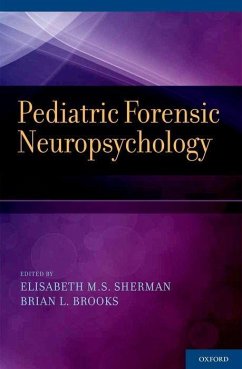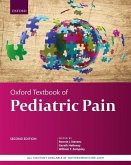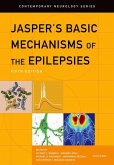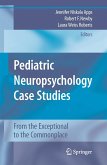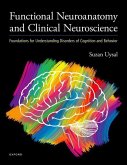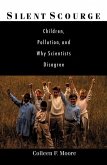Pediatric Forensic Neuropsychology
Herausgeber: Sherman, Elisabeth M S; Brooks, Brian L
Pediatric Forensic Neuropsychology
Herausgeber: Sherman, Elisabeth M S; Brooks, Brian L
- Gebundenes Buch
- Merkliste
- Auf die Merkliste
- Bewerten Bewerten
- Teilen
- Produkt teilen
- Produkterinnerung
- Produkterinnerung
Pediatric Forensic Neuropsychology is the premier reference text on the practice and process of civil forensic neuropsychological assessment of children and adolescents. Written by an expert group of authors, this text is a comprehensive and authoritative guide for neuropsychologists who engage in forensic work.
Andere Kunden interessierten sich auch für
![Oxford Textbook of Pediatric Pain Oxford Textbook of Pediatric Pain]() Oxford Textbook of Pediatric Pain240,99 €
Oxford Textbook of Pediatric Pain240,99 €![Jasper's Basic Mechanisms of the Epilepsies Jasper's Basic Mechanisms of the Epilepsies]() Jasper's Basic Mechanisms of the Epilepsies314,99 €
Jasper's Basic Mechanisms of the Epilepsies314,99 €![Interdisciplinary Pediatric Palliative Care Interdisciplinary Pediatric Palliative Care]() Joanne WolfeInterdisciplinary Pediatric Palliative Care206,99 €
Joanne WolfeInterdisciplinary Pediatric Palliative Care206,99 €![Pediatric Neuropsychology Case Studies Pediatric Neuropsychology Case Studies]() Pediatric Neuropsychology Case Studies240,99 €
Pediatric Neuropsychology Case Studies240,99 €![Oxford Textbook of Palliative Care for Children Oxford Textbook of Palliative Care for Children]() Oxford Textbook of Palliative Care for Children200,99 €
Oxford Textbook of Palliative Care for Children200,99 €![Functional Neuroanatomy and Clinical Neuroscience Functional Neuroanatomy and Clinical Neuroscience]() Suzan UysalFunctional Neuroanatomy and Clinical Neuroscience200,99 €
Suzan UysalFunctional Neuroanatomy and Clinical Neuroscience200,99 €![Silent Scourge Silent Scourge]() Colleen F MooreSilent Scourge60,99 €
Colleen F MooreSilent Scourge60,99 €-
-
-
Pediatric Forensic Neuropsychology is the premier reference text on the practice and process of civil forensic neuropsychological assessment of children and adolescents. Written by an expert group of authors, this text is a comprehensive and authoritative guide for neuropsychologists who engage in forensic work.
Hinweis: Dieser Artikel kann nur an eine deutsche Lieferadresse ausgeliefert werden.
Hinweis: Dieser Artikel kann nur an eine deutsche Lieferadresse ausgeliefert werden.
Produktdetails
- Produktdetails
- Verlag: Hurst & Co.
- Seitenzahl: 400
- Erscheinungstermin: 30. Januar 2012
- Englisch
- Abmessung: 234mm x 156mm x 22mm
- Gewicht: 721g
- ISBN-13: 9780199734566
- ISBN-10: 0199734569
- Artikelnr.: 51964857
- Herstellerkennzeichnung
- Libri GmbH
- Europaallee 1
- 36244 Bad Hersfeld
- gpsr@libri.de
- Verlag: Hurst & Co.
- Seitenzahl: 400
- Erscheinungstermin: 30. Januar 2012
- Englisch
- Abmessung: 234mm x 156mm x 22mm
- Gewicht: 721g
- ISBN-13: 9780199734566
- ISBN-10: 0199734569
- Artikelnr.: 51964857
- Herstellerkennzeichnung
- Libri GmbH
- Europaallee 1
- 36244 Bad Hersfeld
- gpsr@libri.de
Elisabeth M.S. Sherman is the Neuropsychologist and Adjunct Assistant Professor in the Departments of Pediatrics and Clinical Neurosciences and the Director of Pediatric Neuropsychology Fellowship, Alberta Children's Hospital and University of Calgary. Brian L. Brooks is a Neuropsychologist at the Alberta Children's Hospital in Calgary, Alberta and an Adjunct Assistant Professor in the Departments of Pediatrics and Clinical Neurosciences and at the University of Calgary.
* Contributors
* Introduction
* PART ONE: Theoretical, Conceptual, and Psychometric Issues in
Pediatric Forensic Neuropsychology
* 1. Pediatric Neuropsychology in Forensic Proceedings: Roles and
Procedures in the Courtroom and Beyond
* Jerry J. Sweet and Michael Westerveld
*
* 2. Ethical Issues in Pediatric Forensic Neuropsychology
* Shane S. Bush, William S. MacAllister, and Alan Goldberg
*
* 3. Basic Psychometrics and Test Selection for an Independent
Pediatric Forensic Neuropsychology Evaluation
* Cecil R. Reynolds and Arthur MacNeill Horton, Jr.
*
* 4. Improving Accuracy When Identifying Cognitive Impairment in
Pediatric Neuropsychological Assessments
* Brian L. Brooks and Grant L. Iverson
*
* 5. Interpreting Change in Repeated Neuropsychological Assessments of
Children
* Grant L. Iverson
*
* 6. Differential Diagnosis of Malingering and Related Clinical
Presentations
* Daniel J. Slick and Elisabeth M.S. Sherman
*
* 7. Overview of Tests and Techniques to Detect Negative Response Bias
in Children
* Michael W. Kirkwood
*
* 8. Forensic Issues in Neuropsychological Assessment: Culture and
Language
* Danielle N. Landwher and Antolin M. Llorente
*
* 9. Interpretive Confounds in the Independent Pediatric
Neuropsychological Evaluation
* Jacobus Donders
*
* PART TWO: Applied Clinical Issues in Pediatric Forensic
Neuropsychology
* 10. Independent Neuropsychological Evaluation of Children With Mild
Traumatic Brain Injury
* Gerard A. Gioia, Christopher G. Vaughan, and Peter K. Isquith
*
* 11. Independent Neuropsychological Evaluation of Children With
Moderate to Severe Traumatic Brain Injury
* Keith Owen Yeates
*
* 12. Preinjury and Secondary Attention-Deficit/Hyperactivity Disorder
in Pediatric Traumatic Brain Injury Forensic Cases
* Jeffrey E. Max, Russell J. Schachar, and Tisha J. Ornstein
*
* 13. Independent Neuropsychological Evaluation of Children in Medical
Malpractice Cases
* Ida Sue Baron and Joel E. Morgan
*
* 14. Neuropsychological Contributions to Independent Education
Evaluations: Forensic Perspectives
* Lisa G. Hahn and Joel E. Morgan
*
* PART THREE: The Pediatric Forensic Toolbox
* Exhibit A. Sample Consultant-Attorney Agreement
* Exhibit B. Sample Pediatric Forensic Informed Consent Form (Short
Version)
* Exhibit C. Sample Pediatric Forensic Informed Consent Form (Longer
Version)
* Exhibit D. Sample Letter to Parents About Neuropsychological
Assessment
* Exhibit E. Sample Letter to Teacher About Neuropsychological
Assessment
* Exhibit F. Sample Consent Form for Release of Information From School
* Exhibit G. Checklist for a Pediatric Independent Neuropsychological
Evaluation Interview
* Exhibit H. Sample Traumatic Brain Injury Interview Form
* Exhibit I. Sample Background and History Questionnaire
* Index
* Introduction
* PART ONE: Theoretical, Conceptual, and Psychometric Issues in
Pediatric Forensic Neuropsychology
* 1. Pediatric Neuropsychology in Forensic Proceedings: Roles and
Procedures in the Courtroom and Beyond
* Jerry J. Sweet and Michael Westerveld
*
* 2. Ethical Issues in Pediatric Forensic Neuropsychology
* Shane S. Bush, William S. MacAllister, and Alan Goldberg
*
* 3. Basic Psychometrics and Test Selection for an Independent
Pediatric Forensic Neuropsychology Evaluation
* Cecil R. Reynolds and Arthur MacNeill Horton, Jr.
*
* 4. Improving Accuracy When Identifying Cognitive Impairment in
Pediatric Neuropsychological Assessments
* Brian L. Brooks and Grant L. Iverson
*
* 5. Interpreting Change in Repeated Neuropsychological Assessments of
Children
* Grant L. Iverson
*
* 6. Differential Diagnosis of Malingering and Related Clinical
Presentations
* Daniel J. Slick and Elisabeth M.S. Sherman
*
* 7. Overview of Tests and Techniques to Detect Negative Response Bias
in Children
* Michael W. Kirkwood
*
* 8. Forensic Issues in Neuropsychological Assessment: Culture and
Language
* Danielle N. Landwher and Antolin M. Llorente
*
* 9. Interpretive Confounds in the Independent Pediatric
Neuropsychological Evaluation
* Jacobus Donders
*
* PART TWO: Applied Clinical Issues in Pediatric Forensic
Neuropsychology
* 10. Independent Neuropsychological Evaluation of Children With Mild
Traumatic Brain Injury
* Gerard A. Gioia, Christopher G. Vaughan, and Peter K. Isquith
*
* 11. Independent Neuropsychological Evaluation of Children With
Moderate to Severe Traumatic Brain Injury
* Keith Owen Yeates
*
* 12. Preinjury and Secondary Attention-Deficit/Hyperactivity Disorder
in Pediatric Traumatic Brain Injury Forensic Cases
* Jeffrey E. Max, Russell J. Schachar, and Tisha J. Ornstein
*
* 13. Independent Neuropsychological Evaluation of Children in Medical
Malpractice Cases
* Ida Sue Baron and Joel E. Morgan
*
* 14. Neuropsychological Contributions to Independent Education
Evaluations: Forensic Perspectives
* Lisa G. Hahn and Joel E. Morgan
*
* PART THREE: The Pediatric Forensic Toolbox
* Exhibit A. Sample Consultant-Attorney Agreement
* Exhibit B. Sample Pediatric Forensic Informed Consent Form (Short
Version)
* Exhibit C. Sample Pediatric Forensic Informed Consent Form (Longer
Version)
* Exhibit D. Sample Letter to Parents About Neuropsychological
Assessment
* Exhibit E. Sample Letter to Teacher About Neuropsychological
Assessment
* Exhibit F. Sample Consent Form for Release of Information From School
* Exhibit G. Checklist for a Pediatric Independent Neuropsychological
Evaluation Interview
* Exhibit H. Sample Traumatic Brain Injury Interview Form
* Exhibit I. Sample Background and History Questionnaire
* Index
* Contributors
* Introduction
* PART ONE: Theoretical, Conceptual, and Psychometric Issues in
Pediatric Forensic Neuropsychology
* 1. Pediatric Neuropsychology in Forensic Proceedings: Roles and
Procedures in the Courtroom and Beyond
* Jerry J. Sweet and Michael Westerveld
*
* 2. Ethical Issues in Pediatric Forensic Neuropsychology
* Shane S. Bush, William S. MacAllister, and Alan Goldberg
*
* 3. Basic Psychometrics and Test Selection for an Independent
Pediatric Forensic Neuropsychology Evaluation
* Cecil R. Reynolds and Arthur MacNeill Horton, Jr.
*
* 4. Improving Accuracy When Identifying Cognitive Impairment in
Pediatric Neuropsychological Assessments
* Brian L. Brooks and Grant L. Iverson
*
* 5. Interpreting Change in Repeated Neuropsychological Assessments of
Children
* Grant L. Iverson
*
* 6. Differential Diagnosis of Malingering and Related Clinical
Presentations
* Daniel J. Slick and Elisabeth M.S. Sherman
*
* 7. Overview of Tests and Techniques to Detect Negative Response Bias
in Children
* Michael W. Kirkwood
*
* 8. Forensic Issues in Neuropsychological Assessment: Culture and
Language
* Danielle N. Landwher and Antolin M. Llorente
*
* 9. Interpretive Confounds in the Independent Pediatric
Neuropsychological Evaluation
* Jacobus Donders
*
* PART TWO: Applied Clinical Issues in Pediatric Forensic
Neuropsychology
* 10. Independent Neuropsychological Evaluation of Children With Mild
Traumatic Brain Injury
* Gerard A. Gioia, Christopher G. Vaughan, and Peter K. Isquith
*
* 11. Independent Neuropsychological Evaluation of Children With
Moderate to Severe Traumatic Brain Injury
* Keith Owen Yeates
*
* 12. Preinjury and Secondary Attention-Deficit/Hyperactivity Disorder
in Pediatric Traumatic Brain Injury Forensic Cases
* Jeffrey E. Max, Russell J. Schachar, and Tisha J. Ornstein
*
* 13. Independent Neuropsychological Evaluation of Children in Medical
Malpractice Cases
* Ida Sue Baron and Joel E. Morgan
*
* 14. Neuropsychological Contributions to Independent Education
Evaluations: Forensic Perspectives
* Lisa G. Hahn and Joel E. Morgan
*
* PART THREE: The Pediatric Forensic Toolbox
* Exhibit A. Sample Consultant-Attorney Agreement
* Exhibit B. Sample Pediatric Forensic Informed Consent Form (Short
Version)
* Exhibit C. Sample Pediatric Forensic Informed Consent Form (Longer
Version)
* Exhibit D. Sample Letter to Parents About Neuropsychological
Assessment
* Exhibit E. Sample Letter to Teacher About Neuropsychological
Assessment
* Exhibit F. Sample Consent Form for Release of Information From School
* Exhibit G. Checklist for a Pediatric Independent Neuropsychological
Evaluation Interview
* Exhibit H. Sample Traumatic Brain Injury Interview Form
* Exhibit I. Sample Background and History Questionnaire
* Index
* Introduction
* PART ONE: Theoretical, Conceptual, and Psychometric Issues in
Pediatric Forensic Neuropsychology
* 1. Pediatric Neuropsychology in Forensic Proceedings: Roles and
Procedures in the Courtroom and Beyond
* Jerry J. Sweet and Michael Westerveld
*
* 2. Ethical Issues in Pediatric Forensic Neuropsychology
* Shane S. Bush, William S. MacAllister, and Alan Goldberg
*
* 3. Basic Psychometrics and Test Selection for an Independent
Pediatric Forensic Neuropsychology Evaluation
* Cecil R. Reynolds and Arthur MacNeill Horton, Jr.
*
* 4. Improving Accuracy When Identifying Cognitive Impairment in
Pediatric Neuropsychological Assessments
* Brian L. Brooks and Grant L. Iverson
*
* 5. Interpreting Change in Repeated Neuropsychological Assessments of
Children
* Grant L. Iverson
*
* 6. Differential Diagnosis of Malingering and Related Clinical
Presentations
* Daniel J. Slick and Elisabeth M.S. Sherman
*
* 7. Overview of Tests and Techniques to Detect Negative Response Bias
in Children
* Michael W. Kirkwood
*
* 8. Forensic Issues in Neuropsychological Assessment: Culture and
Language
* Danielle N. Landwher and Antolin M. Llorente
*
* 9. Interpretive Confounds in the Independent Pediatric
Neuropsychological Evaluation
* Jacobus Donders
*
* PART TWO: Applied Clinical Issues in Pediatric Forensic
Neuropsychology
* 10. Independent Neuropsychological Evaluation of Children With Mild
Traumatic Brain Injury
* Gerard A. Gioia, Christopher G. Vaughan, and Peter K. Isquith
*
* 11. Independent Neuropsychological Evaluation of Children With
Moderate to Severe Traumatic Brain Injury
* Keith Owen Yeates
*
* 12. Preinjury and Secondary Attention-Deficit/Hyperactivity Disorder
in Pediatric Traumatic Brain Injury Forensic Cases
* Jeffrey E. Max, Russell J. Schachar, and Tisha J. Ornstein
*
* 13. Independent Neuropsychological Evaluation of Children in Medical
Malpractice Cases
* Ida Sue Baron and Joel E. Morgan
*
* 14. Neuropsychological Contributions to Independent Education
Evaluations: Forensic Perspectives
* Lisa G. Hahn and Joel E. Morgan
*
* PART THREE: The Pediatric Forensic Toolbox
* Exhibit A. Sample Consultant-Attorney Agreement
* Exhibit B. Sample Pediatric Forensic Informed Consent Form (Short
Version)
* Exhibit C. Sample Pediatric Forensic Informed Consent Form (Longer
Version)
* Exhibit D. Sample Letter to Parents About Neuropsychological
Assessment
* Exhibit E. Sample Letter to Teacher About Neuropsychological
Assessment
* Exhibit F. Sample Consent Form for Release of Information From School
* Exhibit G. Checklist for a Pediatric Independent Neuropsychological
Evaluation Interview
* Exhibit H. Sample Traumatic Brain Injury Interview Form
* Exhibit I. Sample Background and History Questionnaire
* Index

